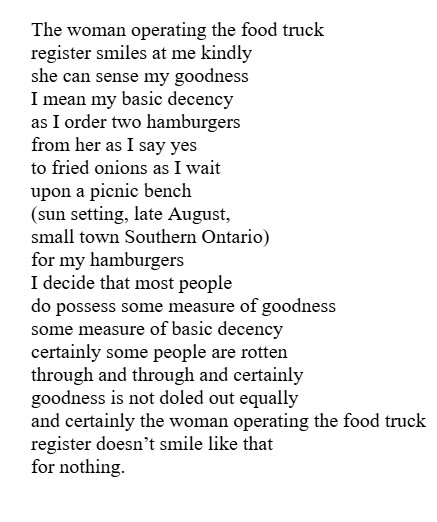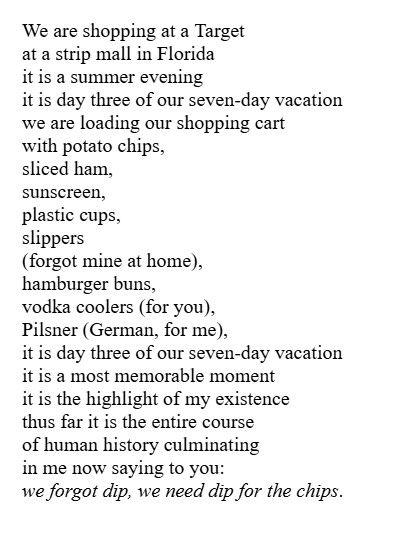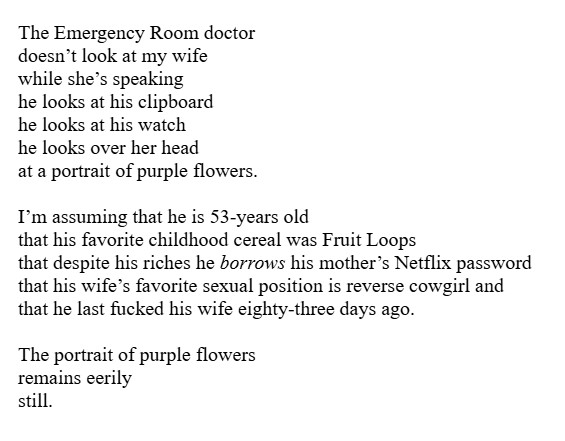By Calvin Cummings
I get together with this guy now that I don’t drink. He’s my not-drinking buddy. I thought our get-togethers would involve more, but our time together has become more about what we don’t do.
His name’s Johnny, but in my phone, I’ve got him saved as “Lifeline.”
Last time I was over there, we were sitting on his back porch, not talking, passing a pack of cigarettes back and forth and freezing our balls off. I asked if he wanted to get something to eat. He shook his head.
“You mind if I go get something?”
He did this backwards nod. Like lifted his chin up. In the drive-thru, I thought about whether this actually meant yes or if it was just an acknowledgement that something was said. Or was it nothing? Are there even words for what it was, or does defining it completely miss the point?
Back on his porch, unwrapping my burgers, I decided it’s just one of those things that words don’t work for. Like how I feel about him and what we do for each other.
We continued not-talking as I ate, the burgers cold and the fries flabby because I drove the fifteen minutes back up the state highway to his house to eat it with him. With every bite the burgers revealed themselves to be what they really were, not food, because once stuff like that gets cold it stops being food, which it never was, you know what I mean? Like as long as it’s hot, you can trick yourself into believing it isn’t what it is, which is what it’s not, but once it’s cold…
Back and forth between the burger and the boagie, putting it down on the plastic chair’s corner with the ember just hanging off. Shivering, chewing. Missing out on the mirage. But even so, I could never bring myself to pull over into a spot in the parking lot and eat everything hot and crisp and alive because then I wouldn’t be with him. So I went back and ate while he didn’t and we continued doing nothing because that’s our way.
Back when I used to drink, I’d do nothing too. One of the nothing-things I’d do was watch nature documentaries, usually with other people, the roommates I used to have before everything spiraled and I landed at my mom’s. Those guys weren’t like me and Johnny. They could watch a peregrine falcon dive for doves, or a baby elephant get separated from the herd in the desert, or learn about the mushrooms under the ground, how they communicate electronically across thousands of miles of rot-eating foam without needing to drink ten, sometimes fifteen beers.
“There’s this jaguar,” I told him after I finished the not-burgers, “that lives in Asia, like around Russia, or maybe even in it. And there are only forty of them, the jaguars, or tigers, this specific one. Can you believe that? And they’d never been captured on camera before these guys did it, the documentary people.”
I knew this because I watched the documentary about the documentary, too. The footage of the footage. The men wrapped in white camo, their telephoto lens peeking through the layers and the snow on top of the layers. That’s how I knew that this mythic creature had never been photographed before. That, before this, it wasn’t totally real, just a legend, a story told over and over.
My man hit me with the inverted nod.
“You should watch it,” I told him. “I can’t describe it. There aren’t words. The way it jumped from rock to rock and crawled out of its hole. This perfect thing. So cool.”
I crinkled up my silvery wrapping papers and shoved them into the bag, tossed it under my chair. An HVAC rattled to life and its hum whited out the evening’s other murmurs.
“Just unbelievable. That these things are out there happening and we don’t even know about it—I don’t know, like it’s so cool that it’s out there. I still can’t believe it.”
Another not-nod.
I’m not explaining this right, how me and him are together. Listen: he means more to me than any other person I’ve ever known and is second only to my higher power. I’m serious. If you gave me a button and told me, “Press this button and someone will die. Someone who is loved by someone else as much as you love this man. But, if you press the button, this man who you love will also feel how much you love him for the rest of his life, at all times forever, and the feeling won’t dissipate or grow stale the way all feelings normally do, it will be constant and buoyant and good forever.” If you gave me a button like that, I would press that button in an instant, because not-doing things with him is the only way I’ve found to prevent myself from doing all the other things I don’t want to do, the things I don’t want to do because I want to do them so badly, the things that every part of me, down to my atoms and the humming space within my atoms, sings for. It’s like no matter what, whether I drink or don’t, a chorus of me-particles belts the hymn of beer inside me, in faith and hope and love, convinced of what great things beer can do for me and us and the world, if only we believed.
But sitting with Johnny makes me think I can learn another tune.
“Yeah, the jaguar looked like how Hot Dog looks when he jumps down from the couch to the floor and then up to the kitchen counter.”
My childhood cat, Hot Dog. Fourteen years old this Christmas, in just a few weeks. He’s third after my H.P. and this guy. But there’s a gap between my number two and my number three, and it’s a lot wider than the gap between one and two.
Chins up from Johnny.
He feels the same way about me that I do about him, I’m sure, because why else would he let me come over? I come over after work, don’t even need to call him, and he’s always back there, dragging off a 27, offering me a light when I ask. I pull a chair up and we can just be. He doesn’t need to talk when we’re back there. He talks plenty in the meetings, where we met. There he tells us about his daughter and his ex-wife. He talks with his hands, shaking his fingers and stretching his arms out wide, telling us, “If I knew where they were I’d go to them, I’d nail myself to a cross in front of them—no, I’d let them nail me to the cross. But she’s changed her number and my mother-in-law won’t give me an inch.”
Sure, we could talk about that stuff. But I think he likes that I can take his mind off all that. I like that I can take our mind off it. And so I tell him other stuff.
“These documentary guys, they did one about the ocean too. Apparently we used to be little tiny one-cell guys,” I said, pinching my fingers, “that didn’t even need air to breathe, and we lived off the methane farted up by the volcano pits down at the bottom of the ocean. Did you know that? That that’s what methane is? Farts? And that the whole world used to be an ocean?”
He readjusted how he was sitting, pulling at the crotch of his pants and crossing his arms, an unbroken stare into the fading-to-black backyard.
“We could just split in two,” I said, “and make more of ourselves. No sex. And now we’re made of trillions of these things.”
There were good times, too, he’d told us, when the kid and her mother and him would be at the zoo, usually after only one or two sips from the flask, before he’d completely emptied it and moved on to whatever wine coolers and domestic cans they served from the popcorn stalls. Everything would be coming into focus, the sunshine making its noontime transition from blue to straw-gold, the weather perfect, sometime between Summer and Fall or Winter and Spring, and he’d see a stuffed penguin or snake or something and pull it off the rack and hold it in front of his daughter’s face and say, “You like that? You want it?” and that’s when he’d notice his daughter’s twisted face, these uncertain curves of mouth and eye that she’d turn to her mother, whose face would also scrunch up, like they both had some pain somewhere deep inside themselves that was flaring up, and he’d go and buy the penguin anyway and hand it to his daughter and she’d shyly walk behind her mother’s legs, who might even have been pulling her.
He said he knew it was all his fault, but that knowing this didn’t stop him blaming them for working against him, for trying to ruin his life by always bringing it all up, by feeling things that made him feel guilty. Because it’s one thing to have a problem and another to have someone have a problem with your problem.
There was some other stuff too. He put his hands on them. He says he’s only been told about it, doesn’t himself remember. And I’m always thinking, like, damn man. Damn. But these are the people who become your brothers when you’ve been where we’ve been.
We don’t talk about any of that now though, not on the porch, leaning back in the plastic chairs, hearing ‘em creak. Pulling our arms into our shirts and rubbing our palms against our ribs. That’s not what the porch is for.
While I talked about poison dart frogs and bonobos, he stood up and limped to the deck edge and peed through the railing onto the grass. Like our doing nothing, this struck as something I’d do while drunk. But that’s the thing: we weren’t drunk. So it was different.
I watched his back, his thinness rippling under the plaid. Steam slipped off his arced stream. I worked my hands under my armpits, trying to get back the feeling. My Johnny.
The HVAC shut off and the splat of his piss on the mud became clear. Enough time passed that I started counting the seconds.
“Phew-wee! You been holding it in?”
He remained concentrated. I fiddled with the name tag on my polo. I work at the TJ Maxx by the quarry. Two months in and I’ve been promoted to customer service specialist. I handle most of the returns. People bring me their used things, stuff they no longer want—things they really should keep given how they’ve been used—or bought by mistake, or bought out of some hope for what the item could do for them, turn them into—expensive blenders, skinny jeans, Star Wars Legos (all on sale)—and I place the things that used to be theirs beneath the counter and run their cards and say, “Thank you for coming in! God bless!” and I mean it, I really mean it.
“The job’s good,” I said to Johnny’s back. “Yeah, the job’s real good. Real good. They think I could move up to management in a year, if I can stay in line.”
He grunted as the stream pittered out to a trickle, zipped himself up, and limped back to me.
“I know I’ve told you already, but you ever need anything,” I said, “you can use my discount.”
He lowered himself into his seat and lit another cigarette. I had to snap to get his attention for the lighter, but then I did the same. We sighed the smoke out. The HVAC chunked back on.
I don’t know what Johnny does other than haunt this house where he used to keep his family. And now I haunt it too. But I guess it’s better to be a living ghost than just plain dead.
“Yeah, real good over there,” I said. “Real good.”
You might think, How could you possibly sit with a man like that? Did you also hit a woman? I’ve already explained it. You either get it or you don’t. And no, by the way, I haven’t but what does that matter? Would you even believe me? Would you even care?
I’m sorry I’m so defensive. Add that to the list of things you either get or you don’t. Now that I think of it, maybe the difference between you and me is that I know what the Apostle Paul’s talking about in Romans, with the whole “I do not do what I want to do, but what I hate.” I don’t need to hit a woman to know that I’m like Johnny, that we’re all Johnny. Maybe you do. Maybe that’s why you hate Johnny. Because he’s who you’d be if life ever forced you to really face yourself.
“So how are you doing anyway? Me talking your ear off as usual,” I asked.
He adjusted himself again, sniffed, rubbed a finger under his nose at some nonexistent snot, then flung his arm outward, turning and looking at me now for the first time all night, those flood-light lit eyes and expressionless smile, and gestured towards the world, like, “This is how I’m doing, my beautiful, dear friend. This. Here.”
I followed the trajectory of his arm, its cast across the backyard and up to the treeline, where bat silhouettes flickered against the blue-steel of night. A mourning dove called. Wind shushed through the deck railing slats. This could be any time. We could be anywhere.
I flung my arm out too, both of us now holding invisible glasses, raised in an unspoken cheers to another God-glorious day plucked from the jaws of our devourer.
Calvin Cummings writes and lives in Baltimore. His work is featured in or forthcoming from Blue Arrangements, Soft Union, Spectra, Scaffold, SWAMP, and others. calvinthomascummings.com



